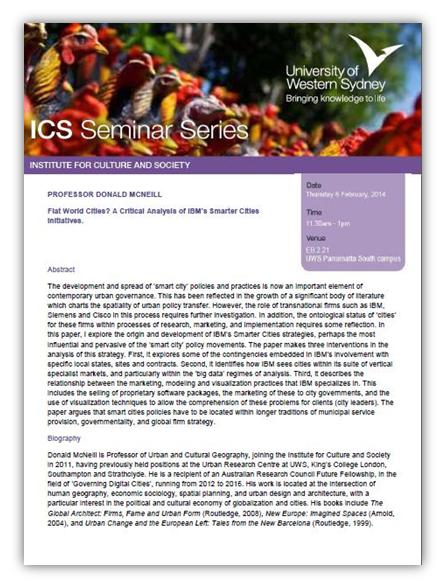ICS Seminar Series - Professor Paul James
Date: Thursday 29 May, 2014
Time: 11.30am - 1pm
Venue: EB.2.21, UWS Parramatta South campus
Professor Paul James
Despite the Terrors of Typologies: Understanding Categories of Difference and Identity
- Listen on SoundCloud (opens in a new window)
Abstract
How is a Hutu person different from a Tutsi? What is the cultural basis for the difference between the Sinhalese, Tamils and Muslims in Sri Lanka? Why are Bosnians Muslim and Serbs Orthodox? The implicit and lived categories of identity that lie behind these questions have had alternatively glorious and vexatious, and sometimes even terrifying consequences across modern history. Being identified as Tutsi or Jew was the basis for intense periods of ethnic genocide. At the same time, categories of identity are the basis of human life and crucial to living with others across the complex boundaries of difference. Who is an Aboriginal person? What does it mean to be black? Identity is foundational to social life, and it is that which makes it a terrain of colonisation, cultural management, and contestation. It also makes it basic to questions of ontological security. Identities are not simply cultural inventions—though of course they can be culturally fabricated, managed, distorted and reduced to simplistic typologies.
Biography
Paul James is Director of the United Nations Global Compact, Cities Programme (Sydney, Melbourne and New York), an International Secretariat hosted by the Institute for Culture and Society. He is Research Director of Global Reconciliation, an international organisation based in Australia that has been doing work in zones of conflict around the world including Sri Lanka and the Middle East, bringing people together in ongoing dialogue. He is on the Council of the Institute of Postcolonial Studies, and a Fellow of the Royal Society of the Arts (London). He is an editor of Arena Journal, as well as an editor/board-member of nine other international journals, including Globalizations and Global Governance. He has delivered invited addresses in over thirty countries and is author or editor of 26 books including most importantly, Nation Formation (Sage, 1996) and Globalism, Nationalism, Tribalism (Sage, 2006). He has been an advisor to a number of agencies and governments including the Helsinki Process, the Canadian Prime Minister’s G20 Forum, and the Commission on Reception, Truth and Reconciliation in East Timor. His work for the Papua New Guinea Minister for Community Development became the basis for their Integrated Community Development Policy.





